人教版八年级下册 Unit 5 What were you doing when the rainstorm came?Section A 3a-3c 课件 (共25张PPT)
文档属性
| 名称 | 人教版八年级下册 Unit 5 What were you doing when the rainstorm came?Section A 3a-3c 课件 (共25张PPT) |  | |
| 格式 | ppt | ||
| 文件大小 | 1.8MB | ||
| 资源类型 | 教案 | ||
| 版本资源 | 人教新目标(Go for it)版 | ||
| 科目 | 英语 | ||
| 更新时间 | 2023-03-13 14:14:17 | ||
图片预览

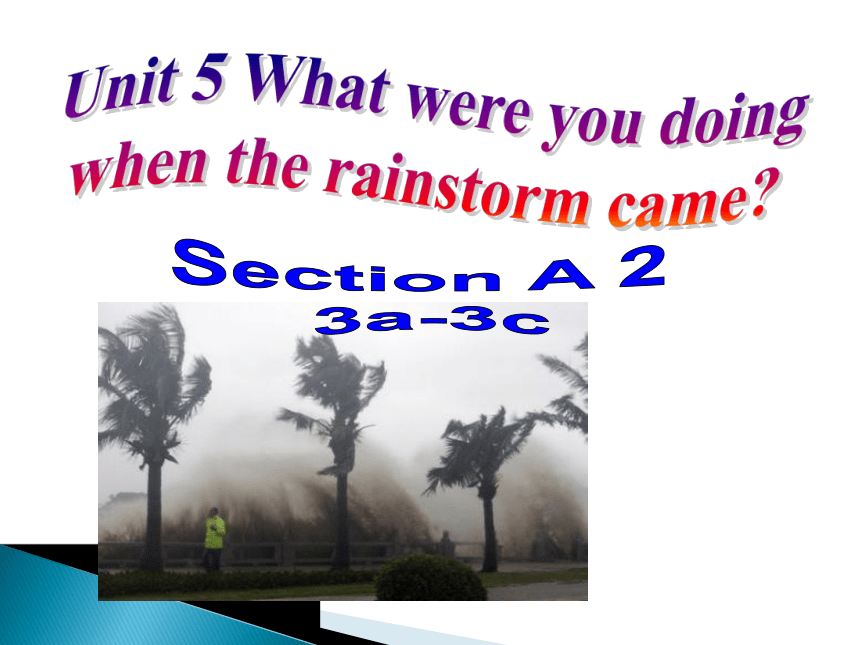
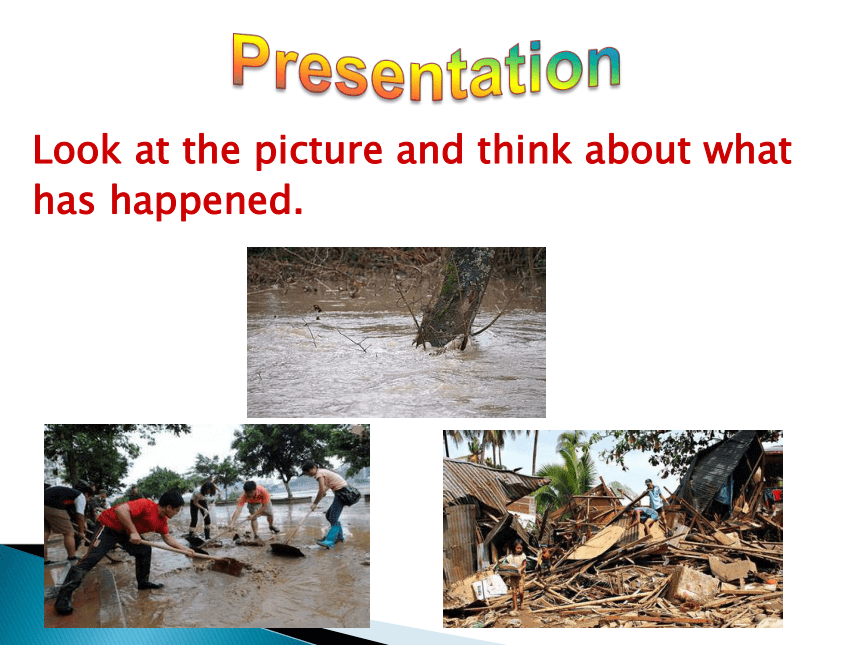
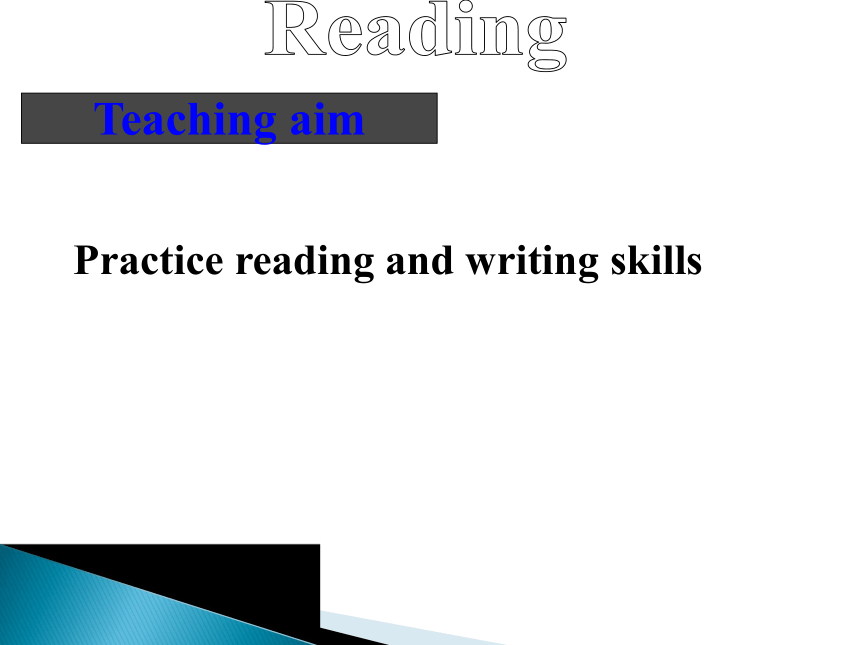
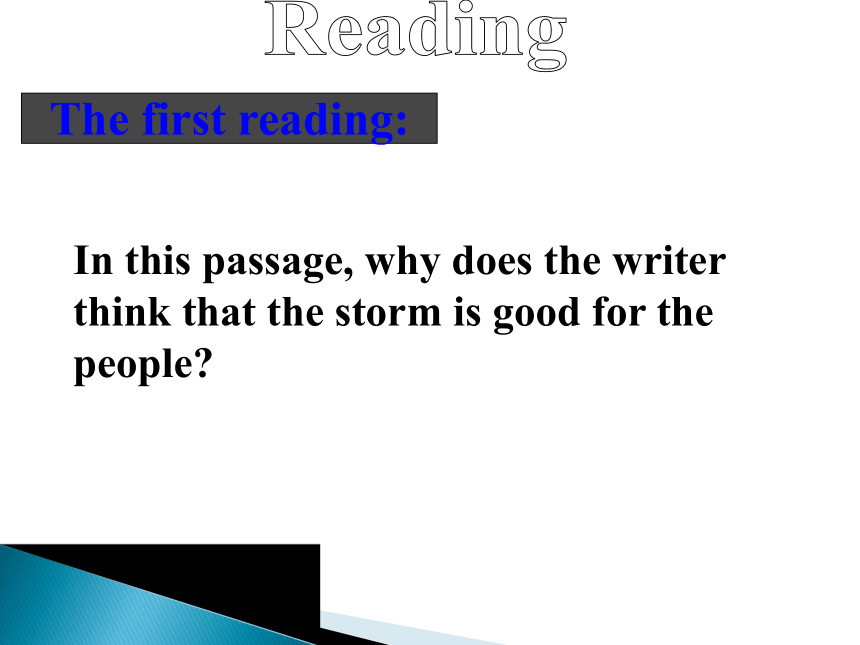
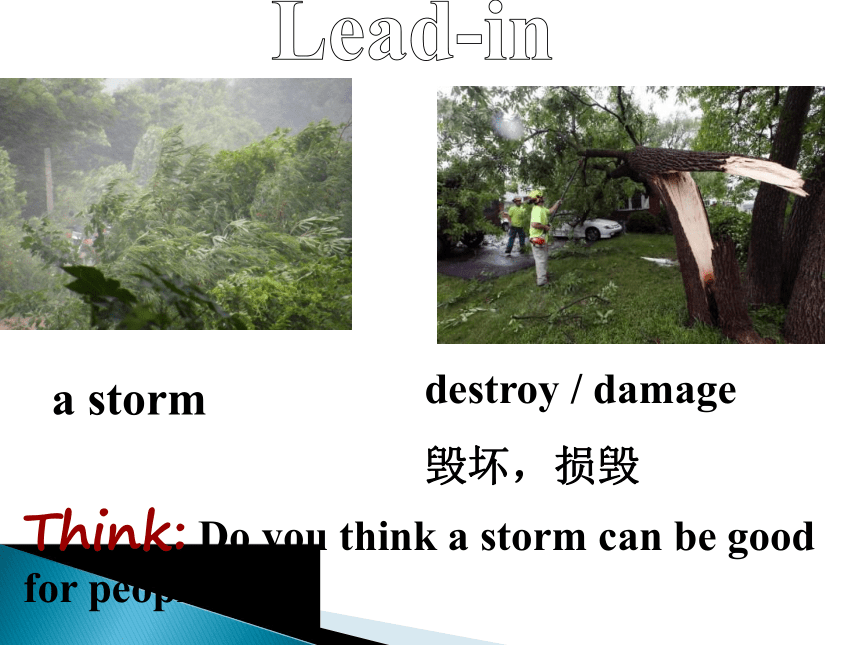
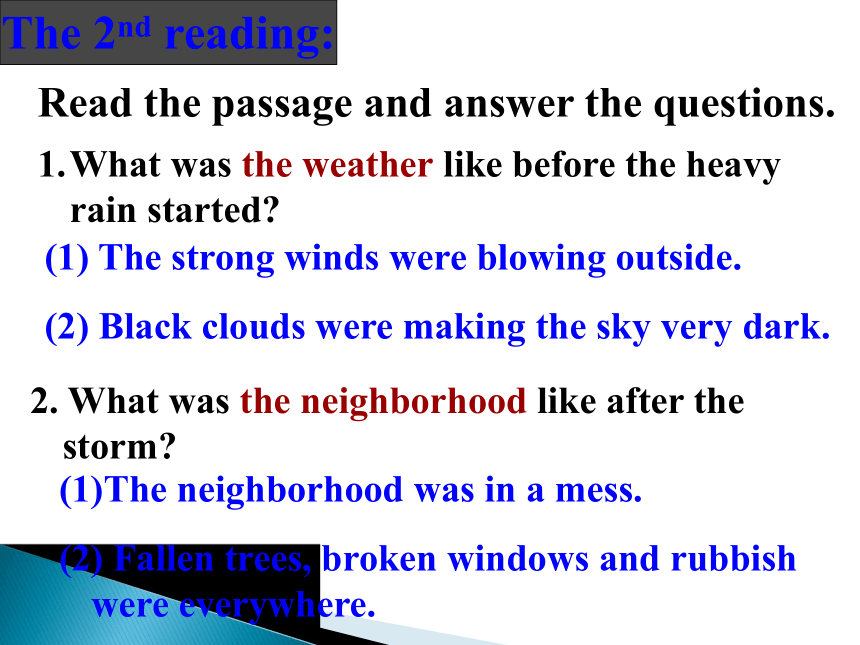
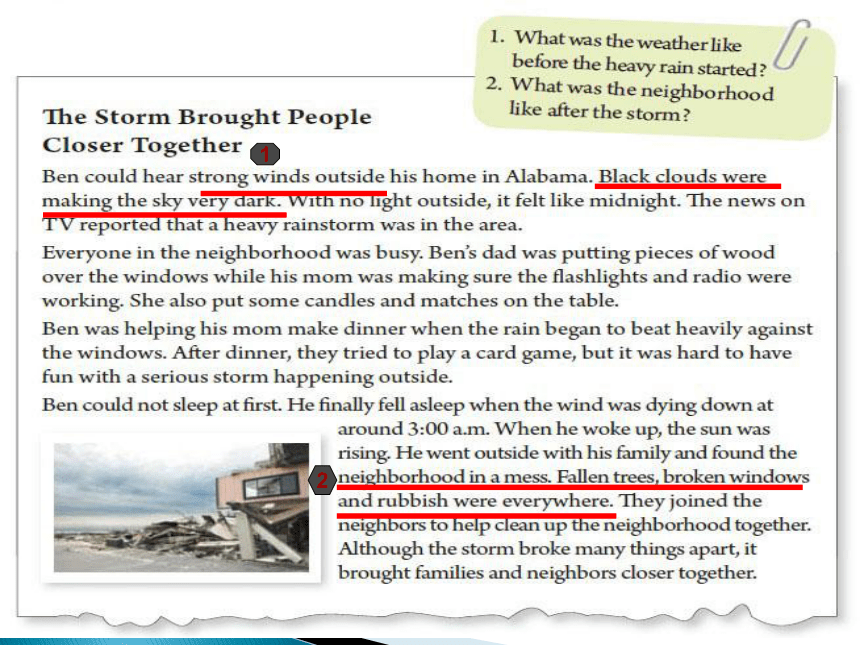
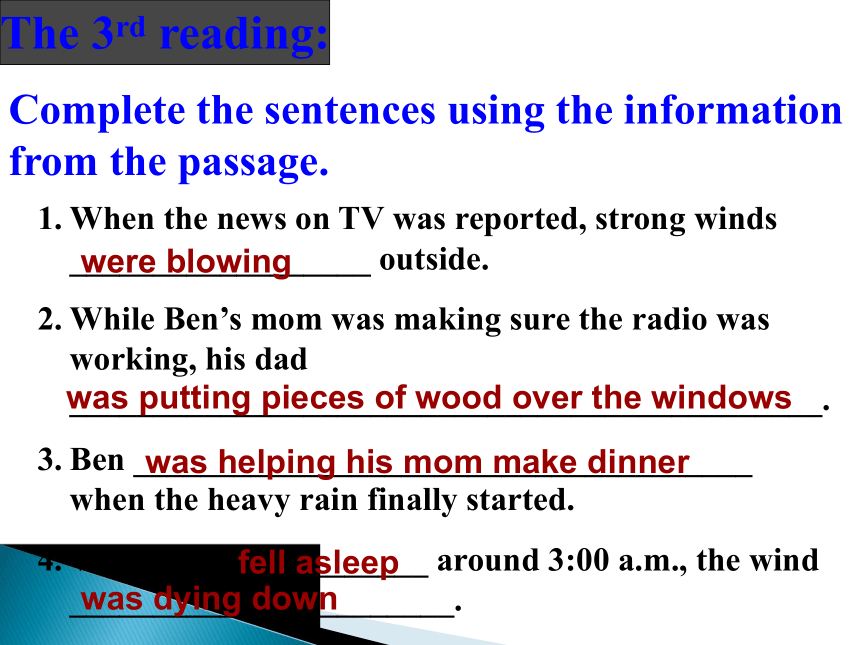
文档简介
(共25张PPT)
在…时候
等公交
(闹钟)响
洗个热水澡
错过公交
雨下得很大
接电话
唤醒,叫醒
at the time of
wait for the bus
go off
take a hot shower
miss the bus
rain heavily
pick up / answer the call
wake up
Translate the expressions
Look at the picture and think about what has happened.
Teaching aim
Practice reading and writing skills
The first reading:
In this passage, why does the writer think that the storm is good for the people
a storm
destroy / damage
毁坏,损毁
Think: Do you think a storm can be good for people
The 2nd reading:
Read the passage and answer the questions.
What was the weather like before the heavy rain started
2. What was the neighborhood like after the storm
(1) The strong winds were blowing outside.
(2) Black clouds were making the sky very dark.
The neighborhood was in a mess.
Fallen trees, broken windows and rubbish were everywhere.
1
2
The 3rd reading:
Complete the sentences using the information from the passage.
When the news on TV was reported, strong winds __________________ outside.
While Ben’s mom was making sure the radio was working, his dad _____________________________________________.
Ben _____________________________________ when the heavy rain finally started.
When Ben ____________ around 3:00 a.m., the wind _______________________.
were blowing
was putting pieces of wood over the windows
was helping his mom make dinner
fell asleep
was dying down
Ben could hear strong winds outside his home in Alabama. Black clouds were making the sky very dark. With no light outside, it felt like midnight. The news on TV reported that a heavy rainstorm was in the area.
1.
1. with no: without 没有
2. feel like: 感觉像
当我在水中游泳的时候感觉自己就像一条鱼。
e.g. I felt like I was a fish when I was swimming in the water.
v. 报道 / reporter n. 记者
Everyone in the neighborhood was busy. Ben’s dad was putting pieces of wood over the windows while his mom was making sure the flashlights and radio were working. She also put some candles and matches on the table.
2.
1. over: (prep.) (部分或者全部覆盖)在…上面
她给熟睡的孩子盖上毯子。
e.g. She put a blanket over the sleeping child.
2. while: (conj.) 在…期间,当…的时候
While we were sleeping, it was snowing outside.
Ben was helping his mom make dinner when the rain began to beat heavily against the windows. After dinner, they tried to play a card game, but it was hard to have fun with a serious storm happening outside.
3.
1. beat against: 雨打,风吹;拍击
e.g. 波浪拍击着海岸。
The waves beat against the sea shore.
2. with + (n.) + doing: 介词+动词的-ing形式,表正在发生的事情。
e.g. With the world changing fast, we have a lot to learn every day.
Ben could not sleep at first. He finally fell asleep when the wind was dying down at around 3:00 a.m. When he woke up, the sun was rising. He went outside with his family and found the neighborhood in a mess. Fallen trees, broken windows and rubbish were everywhere. They joined the neighbors to help clean up the neighborhood together. Although the storm broke many things apart, it brought families and neighbors close together.
4.
1. in a mess: 一团糟,一片混乱
2. fallen trees: 倒伏的树
broken windows:破碎的窗户
动词的过去分词 (v-ed) 做形容词
e.g. The changed program is very helpful.
3. break (sth.) apart:使…分裂开
4. bring (sth.) close together: 把…密切联系到一起
一些大事情的发生总能把人们密切联系到一起。
e.g. Some big events always bring people close together.
1. 感觉像
2. 在这个地区
3. 没有光
4. 逐渐变弱
5. 确信
6. 雨打,风吹,击打
7. 使…破碎,分离
8. 把…密切联系在一起
9. 互相帮助
10. 在困难时期
feel like
in the area
With no light
die down
make sure
beat against
break…apart
bring…close together
help each other
in times of difficulty
重点短语
Post-reading:
Discuss the questions with your partner.
“Although the storm broke many things apart, it brought families and neighbors closer together.”
1. What other things can bring people closer
together
Share your ideas and reasons with your partner first; then share them with the class.
Natural disasters, for example, an earthquake, always brings people closer together.
The Wenchuan earthquake
The Beijing Olympic Games
Big events, for example ,the Olympic Games, can also bring people together.
2. How can we help each other in times of difficulty
cheer people up by saying some kind words to encourage them
(2) donate clothes, food and other things to those who need help
(3) donate some money to those who lost their homes
(4) send some police officers and doctors to save the people in danger
在困境中 --- in times of …在…的时候/时期
What can we learn from this passage other than the language structures
We should protect the environment.
When a natural disaster happens, we human beings should work together to help each other and overcome the difficulties.
(3) We should remember that “each coin has two sides”. Natural disasters can cause lots of damage to the environment, but they can be good for us if people work hard together.
在…时候
等公交
(闹钟)响
洗个热水澡
错过公交
雨下得很大
接电话
唤醒,叫醒
at the time of
wait for the bus
go off
take a hot shower
miss the bus
rain heavily
pick up / answer the call
wake up
Translate the expressions
Look at the picture and think about what has happened.
Teaching aim
Practice reading and writing skills
The first reading:
In this passage, why does the writer think that the storm is good for the people
a storm
destroy / damage
毁坏,损毁
Think: Do you think a storm can be good for people
The 2nd reading:
Read the passage and answer the questions.
What was the weather like before the heavy rain started
2. What was the neighborhood like after the storm
(1) The strong winds were blowing outside.
(2) Black clouds were making the sky very dark.
The neighborhood was in a mess.
Fallen trees, broken windows and rubbish were everywhere.
1
2
The 3rd reading:
Complete the sentences using the information from the passage.
When the news on TV was reported, strong winds __________________ outside.
While Ben’s mom was making sure the radio was working, his dad _____________________________________________.
Ben _____________________________________ when the heavy rain finally started.
When Ben ____________ around 3:00 a.m., the wind _______________________.
were blowing
was putting pieces of wood over the windows
was helping his mom make dinner
fell asleep
was dying down
Ben could hear strong winds outside his home in Alabama. Black clouds were making the sky very dark. With no light outside, it felt like midnight. The news on TV reported that a heavy rainstorm was in the area.
1.
1. with no: without 没有
2. feel like: 感觉像
当我在水中游泳的时候感觉自己就像一条鱼。
e.g. I felt like I was a fish when I was swimming in the water.
v. 报道 / reporter n. 记者
Everyone in the neighborhood was busy. Ben’s dad was putting pieces of wood over the windows while his mom was making sure the flashlights and radio were working. She also put some candles and matches on the table.
2.
1. over: (prep.) (部分或者全部覆盖)在…上面
她给熟睡的孩子盖上毯子。
e.g. She put a blanket over the sleeping child.
2. while: (conj.) 在…期间,当…的时候
While we were sleeping, it was snowing outside.
Ben was helping his mom make dinner when the rain began to beat heavily against the windows. After dinner, they tried to play a card game, but it was hard to have fun with a serious storm happening outside.
3.
1. beat against: 雨打,风吹;拍击
e.g. 波浪拍击着海岸。
The waves beat against the sea shore.
2. with + (n.) + doing: 介词+动词的-ing形式,表正在发生的事情。
e.g. With the world changing fast, we have a lot to learn every day.
Ben could not sleep at first. He finally fell asleep when the wind was dying down at around 3:00 a.m. When he woke up, the sun was rising. He went outside with his family and found the neighborhood in a mess. Fallen trees, broken windows and rubbish were everywhere. They joined the neighbors to help clean up the neighborhood together. Although the storm broke many things apart, it brought families and neighbors close together.
4.
1. in a mess: 一团糟,一片混乱
2. fallen trees: 倒伏的树
broken windows:破碎的窗户
动词的过去分词 (v-ed) 做形容词
e.g. The changed program is very helpful.
3. break (sth.) apart:使…分裂开
4. bring (sth.) close together: 把…密切联系到一起
一些大事情的发生总能把人们密切联系到一起。
e.g. Some big events always bring people close together.
1. 感觉像
2. 在这个地区
3. 没有光
4. 逐渐变弱
5. 确信
6. 雨打,风吹,击打
7. 使…破碎,分离
8. 把…密切联系在一起
9. 互相帮助
10. 在困难时期
feel like
in the area
With no light
die down
make sure
beat against
break…apart
bring…close together
help each other
in times of difficulty
重点短语
Post-reading:
Discuss the questions with your partner.
“Although the storm broke many things apart, it brought families and neighbors closer together.”
1. What other things can bring people closer
together
Share your ideas and reasons with your partner first; then share them with the class.
Natural disasters, for example, an earthquake, always brings people closer together.
The Wenchuan earthquake
The Beijing Olympic Games
Big events, for example ,the Olympic Games, can also bring people together.
2. How can we help each other in times of difficulty
cheer people up by saying some kind words to encourage them
(2) donate clothes, food and other things to those who need help
(3) donate some money to those who lost their homes
(4) send some police officers and doctors to save the people in danger
在困境中 --- in times of …在…的时候/时期
What can we learn from this passage other than the language structures
We should protect the environment.
When a natural disaster happens, we human beings should work together to help each other and overcome the difficulties.
(3) We should remember that “each coin has two sides”. Natural disasters can cause lots of damage to the environment, but they can be good for us if people work hard together.
同课章节目录
- Unit 1 What's the matter?
- Section A
- Section B
- Unit 2 I'll help to clean up the city parks.
- Section A
- Section B
- Unit 3 Could you please clean your room?
- Section A
- Section B
- Unit 4 Why don't you talk to your parents?
- Section A
- Section B
- Unit 5 What were you doing when the rainstorm came
- Section A
- Section B
- Review of Units 1-5
- Unit 6 An old man tried to move the mountains.
- Section A
- Section B
- Unit 7 What's the highest mountain in the world?
- Section A
- Section B
- Unit 8 Have you read Treasure Island yet?
- Section A
- Section B
- Unit 9 Have you ever been to a museum?
- Section A
- Section B
- Unit 10 I've had this bike for three years.
- Section A
- Section B
